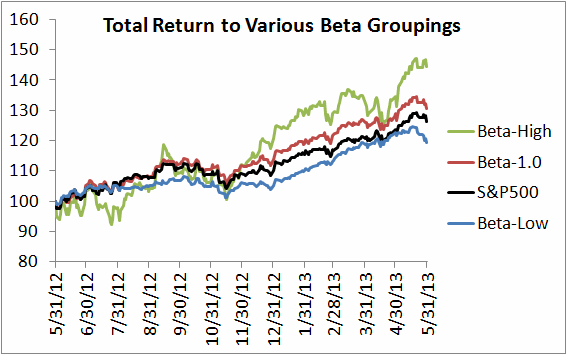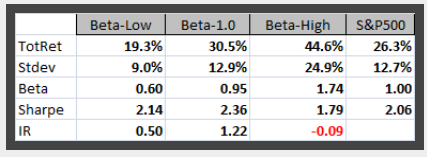Low volatility had a bad month in May, and there has been a slew of commentary on this - see Abnormal Returns for a bunch of links.
Deutsche Bank's 'The Quant View' by Rochester Cahan summarized the month's performance by noting that "Last month we argued that the Low Volatility/High Dividend Yield trade was looking crowded, and cautioned that this could indicate elevated downside risk. It turns out that call was prescient."
"Could" and "change in probability" means nothing, because it's consistent with anything, eg, if the rate rises it's hardly testable because the old and new probability are couched merely as possibilities, and if the probability doesn't change, that's in the forecast too ('could'). Now if they said, don't buy or short strategy X this month, that would have been prescient. I wonder if such people realize how disingenuous this is, or if they think their nuance is actually highly rigorous analysis.
In any case, last month was very bad for low volatility strategies, leading many researchers to reassess the validity of this approach. But, to put it in perspective, here's the total return over the past 12 months, using my beta data.
Clearly the past year, higher beta has been the better place to be, while lower beta has not. As the SP500 rose 26% from May 31 2012 through May 31 2013, this is not surprising: on average, over shorter horizons like years, betas are accurate, so higher beta stocks do better in rising markets, lower beta portfolios underperform. For example, over the past year, given the SP500 rose 26%, low beta stocks rose 70% of that, high beta 170% of that, implying betas of 0.7 and 1.7, which is totally consistent with the simple CAPM for the high beta stocks, and better-than-expected for the low beta portfolio (ie, its beta was 0.6 in that period). If you bought low vol stocks not understanding this, well, you really need to.
Now, many people seem to infer from this that low vol/beta has been a bad bet over the past year. If you evaluate yourself purely against the indices, this is true: deviations from the benchmark are only good if they are above the benchmark. Yet, in simple Sharpe ratio or Information ratio, high beta portfolio did poorly, even in this period. The clear winner is actually a Beta-1.0 portfolio, which has the highest Sharpe and Information ratio. Like low volatility, I have championed the beta 1.0 portfolio for a while, and I'm sure it will be a big fund someday.
Stats on US portfolios, 5/31/12-5/31/13
Internationally we see the same thing: low vol did worse in raw returns, but much better in a pure Sharpe.
See data here. I think this highlights a profound truth, that as a practical matter investors don't care about Sharpe ratios as much as returns relative to the benchmark.
- English (UK)
- English (India)
- English (Canada)
- English (Australia)
- English (South Africa)
- English (Philippines)
- English (Nigeria)
- Deutsch
- Español (España)
- Español (México)
- Français
- Italiano
- Nederlands
- Português (Portugal)
- Polski
- Português (Brasil)
- Русский
- Türkçe
- العربية
- Ελληνικά
- Svenska
- Suomi
- עברית
- 日本語
- 한국어
- 简体中文
- 繁體中文
- Bahasa Indonesia
- Bahasa Melayu
- ไทย
- Tiếng Việt
- हिंदी
Low Vol Strategies Crushed In May
Published 06/10/2013, 01:18 AM
Updated 07/09/2023, 06:31 AM
Low Vol Strategies Crushed In May
3rd party Ad. Not an offer or recommendation by Investing.com. See disclosure here or
remove ads
.
Latest comments
Install Our App
Risk Disclosure: Trading in financial instruments and/or cryptocurrencies involves high risks including the risk of losing some, or all, of your investment amount, and may not be suitable for all investors. Prices of cryptocurrencies are extremely volatile and may be affected by external factors such as financial, regulatory or political events. Trading on margin increases the financial risks.
Before deciding to trade in financial instrument or cryptocurrencies you should be fully informed of the risks and costs associated with trading the financial markets, carefully consider your investment objectives, level of experience, and risk appetite, and seek professional advice where needed.
Fusion Media would like to remind you that the data contained in this website is not necessarily real-time nor accurate. The data and prices on the website are not necessarily provided by any market or exchange, but may be provided by market makers, and so prices may not be accurate and may differ from the actual price at any given market, meaning prices are indicative and not appropriate for trading purposes. Fusion Media and any provider of the data contained in this website will not accept liability for any loss or damage as a result of your trading, or your reliance on the information contained within this website.
It is prohibited to use, store, reproduce, display, modify, transmit or distribute the data contained in this website without the explicit prior written permission of Fusion Media and/or the data provider. All intellectual property rights are reserved by the providers and/or the exchange providing the data contained in this website.
Fusion Media may be compensated by the advertisers that appear on the website, based on your interaction with the advertisements or advertisers.
Before deciding to trade in financial instrument or cryptocurrencies you should be fully informed of the risks and costs associated with trading the financial markets, carefully consider your investment objectives, level of experience, and risk appetite, and seek professional advice where needed.
Fusion Media would like to remind you that the data contained in this website is not necessarily real-time nor accurate. The data and prices on the website are not necessarily provided by any market or exchange, but may be provided by market makers, and so prices may not be accurate and may differ from the actual price at any given market, meaning prices are indicative and not appropriate for trading purposes. Fusion Media and any provider of the data contained in this website will not accept liability for any loss or damage as a result of your trading, or your reliance on the information contained within this website.
It is prohibited to use, store, reproduce, display, modify, transmit or distribute the data contained in this website without the explicit prior written permission of Fusion Media and/or the data provider. All intellectual property rights are reserved by the providers and/or the exchange providing the data contained in this website.
Fusion Media may be compensated by the advertisers that appear on the website, based on your interaction with the advertisements or advertisers.
© 2007-2024 - Fusion Media Limited. All Rights Reserved.
